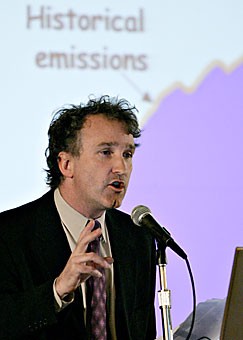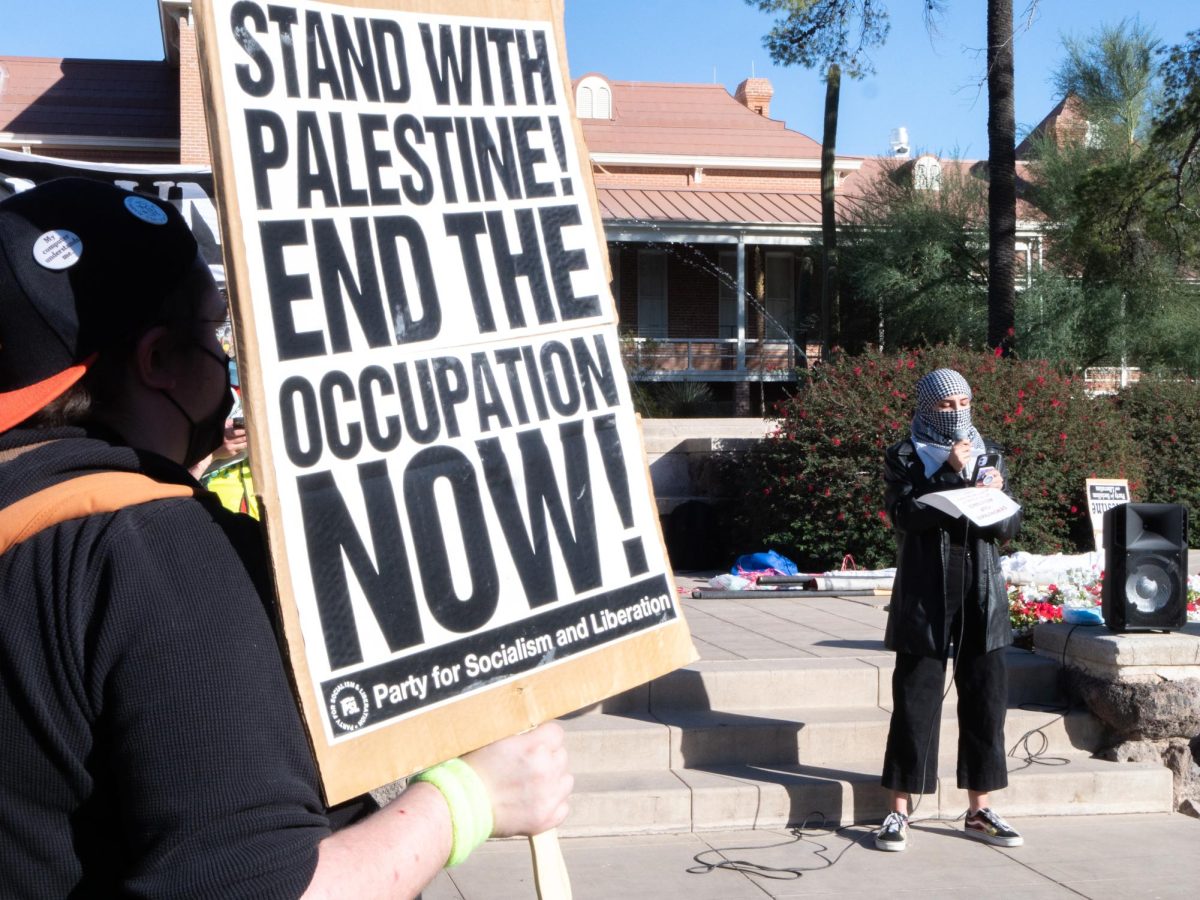TEMPE – If you couldn’t tell you were at an environmental conference by the “”green”” bus that transported participants up to Phoenix, the corn syrup silverware and compost bin at lunch were dead giveaways.
At the first-ever Conference on Climate Change and Higher Education held yesterday at Arizona State University, representatives from all three of Arizona’s universities discussed current issues concerning the environment and different means of becoming more eco-friendly.
“”The evidence for global warming is now unequivocal,”” said UA professor Jonathan Overpeck. “”The evidence is not just in rising temperature, but the oceans are warming, snow is retreating, glaciers are melting, hurricanes are becoming more intense. It’s happening as was predicted when I was a graduate student 25 years ago, and it’s happening with statistical confidence.””
As a member of the Intergovernmental Panel on Climate Change and a recipient of the Nobel Peace Prize along with Al Gore, Overpeck was among a powerhouse of speakers including University presidents Robert Shelton (UA), Michael Crow (ASU) and John Haeger (Northern Arizona University) who spoke to an audience of more than 200 in Carson Ballroom on ASU’s Tempe campus.
Following Overpeck’s speech on the impacts of climate change, ASU geography professor Patricia Gober discussed global warming’s social implications, and Bruce Hungate, an assistant professor in ecosystem ecology at NAU, followed with solutions for mitigating climate change.
Discussion also surrounded the many different ways each state university is becoming more “”green.””
Haeger spoke about NAU’s yellow-bike program, in which unclaimed bikes at the end of each semester are painted yellow and turned into communal transportation.
Crow advertised ASU’s newly created School of Sustainability, in which the undergraduate and graduate divisions are degree-granting programs combining economics, social science and environmental research.
Shelton pointed to the more than 160 UA classes addressing sustainability issues.
“”We are here to begin a conversation about adaptive management at our institutions,”” Shelton said. “”In many ways, it’s time for the universities to follow the lead of a new generation of students.””
UA Focus the Nation coordinator Vincent Pawlowski, who publically vowed to fast until Congress passed new resolutions to combat global warming, was also present.
The gravity of the conference was alleviated by Hungate’s cartoons, notably a depiction of U.S. Environmental Protection Agency members dumping ice cubes into the ocean in a futile attempt to cool the atmosphere.
“”Dumping ice cubes in the ocean won’t do the trick,”” Hungate quipped.
The conference quickly assumed a serious but optimistic tone about the role higher
education can play in influencing environmental change. Arizona’s university presidents took the stage to point out the collective “”green”” advancements on Arizona campuses.
As the conference wound down, Jonathan Fink, ASU’s chief sustainability officer; Laura Huenneke, dean of NAU’s College of Engineering and Natural Sciences; Overpeck, Hungate, Regent Fred DuVal and ASU doctoral candidate Thad Miller were each asked during a panel discussion for one piece of advice about mitigating global warming.
Their responses were as disparate as the speakers themselves.
Among the solutions were: encourage optimism (Fink), be moral (Miller), be braver (Huenneke) and be unreasonable (DuVal).
DuVal’s comment was met with resounding applause.
“”Don’t be held back by the panopoly of issues facing us,”” DuVal said.
His activist sentiments echoed an earlier, even more impassioned speech by Regent Ernest Calderon. Calderon roused the audience from a quiescent state when he claimed that scientists and academics had become timid and ineffective.
“”We’ve educated students who are unfamiliar with global warming,”” Calderon said. “”When I interview 17 of Arizona’s brightest students and only one can mention anything related to global warming, we’ve failed.””
Perhaps another indicator of Arizona universities’ failure to educate students was the minimal amount of students present at the conference, among a crowd of tweed coats and briefcases.
“”I’m hopeful about the outcome (of the conference), but I’m not hopeful in terms of the number of students in attendance,”” said UA student Lon Huber, a public policy junior and an executive assistant for the Arizona Research Institute for Solar Energy. “”I’m concerned not that many students (were) here.””









